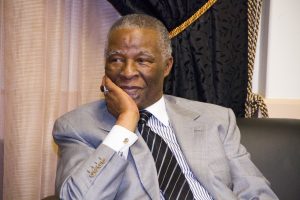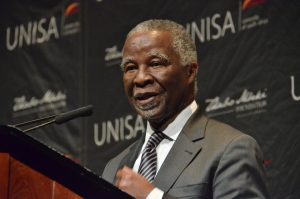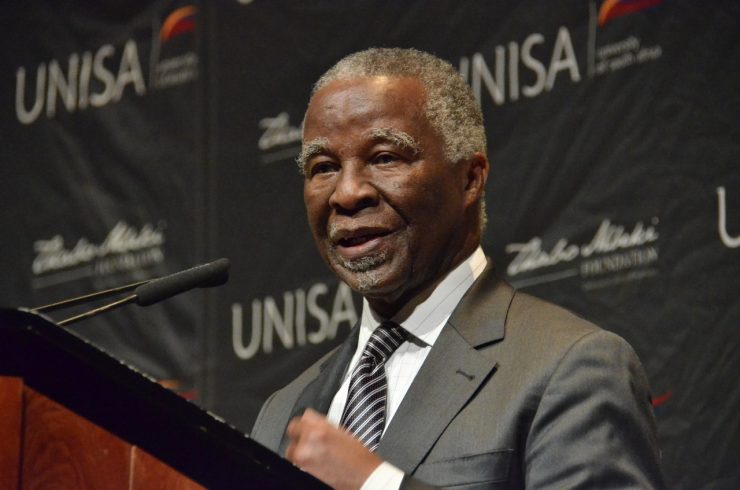I was honoured to deliver the 12th Thabo Mbeki Africa Day Lecture on “The Africa Union at 20” a couple of weeks ago. In a few days, on June 19, 2022, President Thabo Mbeki will be our guest on an edition of The Toyin Falola Interviews. Interestingly, that will be a day after his 80th birthday. Among my friends and people I highly revere, President Thabo Mbeki will be the newest to join the Octogenarian Club. Not every human is privileged to witness eighty years on earth. Beyond witnessing, only a few people have had the opportunity to have experienced the kind of life Thabo Mbeki has enjoyed. And even fewer of that age range can claim to have had as many impacts and influence as the second President of South Africa has had, not only in his home country, South Africa but also on the African continent and the world at large.
In human societies, the idea of change is an often-romanticised concept. While we love the concept of change, especially if it is positive or neutral, we are not always openly receptive to it when it happens to us. We shy away from it and are sometimes all-attacking on the harbinger of change, especially if it involves someone we love and idolise. Just as high school students would give a hard time to a new teacher employed as a replacement for their retired favourite teacher is the way the people of a country would give a hard time to the successor of their favourite president and idol. President Thabo Mbeki was faced with a somewhat similar situation. Having succeeded South Africa’s most-revered, idolised, and loved president, Nelson Mandela, anyone would be right to think that President Mbeki’s administration would face huge criticisms and attacks. Truly, it faced criticisms and attacks, even from within the inner circles of the party. Nonetheless, his governance and significant contributions to the Pan-African state prove that a country may have more than one impactful hero and revered national in succession.

Thabo Mbeki is a full-blooded Pan-Africanist. He was born into the African National Congress, the South African political party that has been solely responsible for producing the country’s presidents since independence. President Mbeki’s father was a vocal and influential member of the African National Congress, and young Thabo spent his childhood learning the party’s values, ideals, culture, and norms. As he grew older, he became more familiar with the ideals and struggles of the party. Being a member of the most notable party opposing the apartheid government and its system in the country, Thabo Mbeki had a first-hand experience of what his people were made to go through. He saw how his people were considered anti-people, dangerous, and dissenting in their home country! Thus, from an early age, Mbeki learned to associate with his people, identify himself with them, and join them in fighting for their cause.
The African National Congress can never forget Mbeki’s strategic and diplomatic roles in shaping the party’s social proof and acceptability. Mbeki’s activism as a party member was on an intellectual and diplomatic front. He championed the intellectual battle against the apartheid government with other countries worldwide. Thanks to Mbeki and his contributions to the party, the injustices of the apartheid government got more international media coverage, drawing the attention of other nations to the plights of the indigenous South Africans and the need to put an end to the apartheid system in the country. Using his skills and experience, Mbeki was one of the African National Congress’ bulwarks, pre-and post-1990.
Although President Mbeki spent his early adult life at a university in England, he returned home in time to witness the lifting of the ban on the activist African National Congress party. Furthermore, he continued to commit more of his time and energy to the party, which saw him rise through the ranks, becoming the Deputy President of the African National Congress Party in 1994. Thus, it was not a surprise when he emerged as South Africa’s first Deputy President to Nelson Mandela. In his capacity as Deputy President, Thabo Mbeki was not a ceremonial office holder like the average Vice or Deputy President. He was both Deputy President and Prime Minister, seeing to the day-to-day of the South African government. If the Mandela-led South African government were a company, Mandela would have been the Chief Executive Officer or Board Chairman, and Thabo Mbeki the Chief Operations Officer. Such was his involvement in the government of his predecessor.
President Mbeki helped institutionalise some memorable policies during the Mandela government, which he continued to uphold during his governance. He played a participatory and important role in the first post-apartheid government, resulting in his appointment as the President of the African National Congress in 1997. His emergence as the president of the country’s most influential political party also meant his eventual nomination as the unopposed presidential candidate of the party. President Mbeki became the second President of South Africa in 1999, with Jacob Zuma as his Deputy. As President, Mbeki proved that his election to power was not a waste. He deployed strategies that helped the South African economy grow and become a fertile ground for home-based and foreign investors. Undeniably, one of the best governments, if not the best, that South Africa has ever witnessed was that of Mbeki. There was a drastic drop in the nation’s debt and budget deficit, and President Mbeki also championed economic growth—not through unrealistic leaps and bounds but consistent and growth-focused measures.

During his time in government, Mbeki proved his Pan-African spirit to the core. He further developed and supported the Black Economic Programme, and some of his policies were considered socio-democratic because they were citizen-focused. However, no human is without enemies, and no one is perfect. Even within his innermost circle, Mbeki had his fair share of hatred, hostility, and conspiracy. Although he was the most qualified to lead the country, and he made several propositions and introduced life-improving policies, internal crises in his party that were fundamentally about his deviation from so-called extremist socialist views led to his removal from the position of the party president.
President Mbeki also had a rough time with Jacob Zuma, who was supposed to be his Deputy and right-hand man. Zuma, who became the country’s fourth president, had corruption cases and clues that he was involved in shady business in government. As a principled man, Mbeki would have none of that. Things escalated to the extent that Mbeki removed Zuma from office and replaced him with Phumzile Mlambo-Ngcuka, South Africa’s first female Deputy President. The choice of a female replacement for Jacob Zuma proves that Thabo Mbeki is a leader who ranks competence, skills, and experience above biases like ethnicity and gender. His choice of Ngcuka as his Deputy opened the door for the participation of more women in high-ranking political positions in the country, seeing as the next Deputy President was also female.
Mbeki’s replacement of Jacob Zuma further aggravated the issues that his party leaders had with him. As a result, his second term in office was cut short because they pressured him to resign. Anyone who has followed the turn of things in South Africa will agree that forcing Mbeki to resign was a mistake.
Mbeki is a Pan-Africanist committed to the revival of Africa without looking back, despite a forceful and bad outing from governance. He has contributed to democracy and Pan-Africanism through thought-provoking lectures and books. Also, Mbeki was instrumental to South Africa’s swift rise to become one of Africa’s most recognised states, as he championed several Africa-facing policies at a continental level. His other contributions to the continent and the world include the Thabo Mbeki Foundation, the Thabo Mbeki School, and the Thabo Mbeki Presidential Library. Through these, Mbeki furthers his beliefs in and advocacy for an African renaissance. No human is infallible. President Mbeki’s government had its downsides; however, casting our reminiscent thoughts about South Africa during Mbeki’s tenure reveals nothing short of a strategic economic and political foundation and expansion.
For all the good he has done, the kind of life he has led, his convictions, and his Pan-Africanism, I felicitate President Thabo Mbeki on the occasion of his 80th year on earth! Please join us for a conversation with President Thabo Mvuyelwa Mbeki
Sunday, June 19, 2022
5:00 PM South Africa
4:00 PM Nigeria
3:00 PM GMT
10:00 AM Austin CST
Register and Watch:
https://www.tfinterviews.com/post/thabo-mbeki














You must be logged in to post a comment.